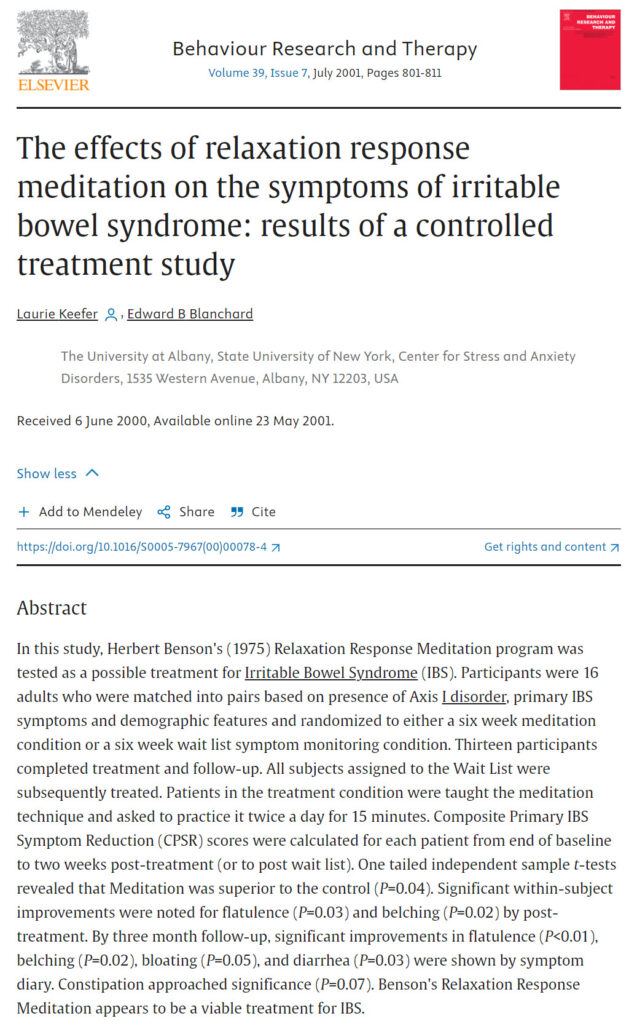In this study, Herbert Benson’s (1975) Relaxation Response Meditation program was tested as a possible treatment for Irritable Bowel Syndrome (IBS). Participants were 16 adults who were matched into pairs based on presence of Axis I disorder, primary IBS symptoms and demographic features and randomized to either a six week meditation condition or a six week wait list symptom monitoring condition. Thirteen participants completed treatment and follow-up. All subjects assigned to the Wait List were subsequently treated. Patients in the treatment condition were taught the meditation technique and asked to practice it twice a day for 15 minutes. Composite Primary IBS Symptom Reduction (CPSR) scores were calculated for each patient from end of baseline to two weeks post-treatment (or to post wait list). One tailed independent sample t-tests revealed that Meditation was superior to the control (P=0.04). Significant within-subject improvements were noted for flatulence (P=0.03) and belching (P=0.02) by post-treatment. By three month follow-up, significant improvements in flatulence (P<0.01), belching (P=0.02), bloating (P=0.05), and diarrhea (P=0.03) were shown by symptom diary. Constipation approached significance (P=0.07). Benson’s Relaxation Response Meditation appears to be a viable treatment for IBS.
The effects of relaxation response meditation on the symptoms of irritable bowel syndrome: results of a controlled treatment study
Publication
Behavior Research and Therapy
39(7):801-11
Abstract
Web and Email Links
Related Listings
Journal
Minn Med.
Although the physiological and biochemical changes that occur during the acute stress response have been well-characterized, the contrasting changes that underlie the relaxation response evoked by various mind-body techniques are less understood. To help guide future mind-body research, we present a conceptual model that integrates patterns of change at the physiological and molecular levels. In addition, we point to future research opportunities and discuss how repeated elicitation o […]
Journal
Headache, the Journal of Head and Face Pain
PHYSIOLOGIC CHANGES consistent with the decreased sympathetic nervous system activity are present during the practice of a relaxation technique, Transcendental Meditation. The changes consist of decreased oxygen consumption, carbon dioxide elimination, respiratory rate and minute ventilation. Arterial blood lactate decreases markedly. Arterial blood pH and base excess decrease slightly. There are no changes in arterial blood pressure, in respiratory quotient, nor in rectal temperature […]
Journal
Behavior Therapy
The majority of individuals with insomnia treated with single behavioral interventions do not achieve normal sleep. In this study, individuals with chronic sleep-onset insomnia (n=12) were treated with a sequentially administered multifactor behavioral intervention consisting of sleep restriction, modified stimulus control, and relaxation training. They were compared to age- and sex-matched normal sleepers (n=14) prior to and following treatment using home-based polysomnography and po […]

